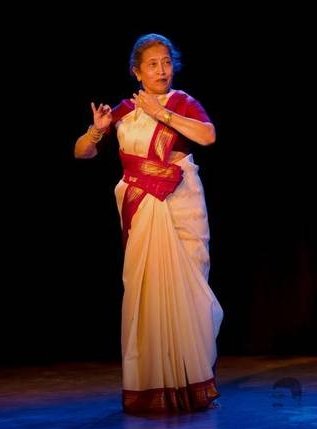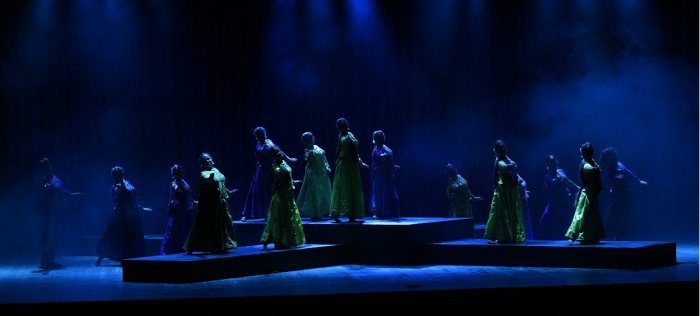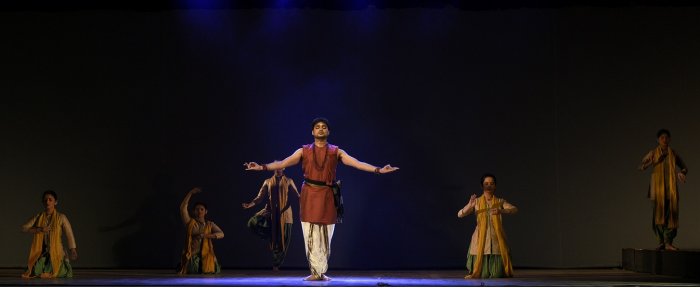
|
 |

|
 |
Shama Bhate: Reclaiming the stage - Nikhil Ravi Parmar e-mail: nikhilraviparmar@gmail.com October 27, 2020 Guru Shama Bhate, also known as Shama Tai, is a Kathak exponent whose career spans over 40 years. She has been learning and performing Kathak from the age of 4 and is a teacher involved with choreography and training of Kathak dancers. Guru Shama Bhate celebrates the thirty third anniversary of her dance institute 'Nadroop, the school of Kathak dance' based out of Pune, Maharashtra. The institute grows a leg stronger with every passing year nurturing young dancers, musicians and attributing to the very basic foundation of 'quality over quantity.' The pandemic has been no different as an experience for all artistes, but with the robust will and fierce determination to inspire, Nadroop explores different possibilities in the ever-changing times of technology. Through curation, creation and challenges, Nadroop dives into the digital realm reclaiming the stage in their first ever online festival to celebrate the essence of Kathak. ROOPBANDH is scheduled for the 7th & 8th November 2020.  Shama Bhate In conversation with Shama Tai... Your thoughts about the present scenario in the field of classical arts and how can you and your vast team of dancers and supporters be able to cope as a premier institute of Kathak in Pune? At 70 today, I've always been inspired by the younger generation of dancers and students who have always added value to my training. I have been blessed with students and disciples who are dedicated, committed and motivated about their practice and routines and this in turn keeps pushing me in every possible way, to give back to their young spirits. As an institute, I have always believed in creating opportunities for one to understand the art form better. I take pride and responsibility in guiding, nurturing and in the holistic development of each and every one of my students through the forty odd years as a teacher. The current circumstances have not been easy for artistes everywhere. Social distancing has left performers and audiences with no other option than to keep performances on hold. Followed by financial instability and uncertainty, it undoubtedly is never easy for us artistes. Even seasoned artistes have had to adapt and make themselves accessible to students through various online mediums. I must say, it wasn't easy but well worth every effort! As an institute, I have always believed in creating opportunities for one to understand the art form better - from a video presentation 'Shubham Bhavatu' to a 'Dha Ta Ka Thunga Challenge' for all dance students to a series of conversational sagas through 'Vedh' a knowledge chapter of Nadroop. I have been adapting to this new digital platform which adds a new dimension to the traditionalism and classicisms we represent and revere. Celebrating the thirty third anniversary, how smooth has the transition been for the institute? Nadroop organized a series of lectures, several interactive sessions with our stalwarts on various topics. With the vision to create a sustainable and interactive platform, Nadroop organised Chaturvidh Abhinay, a chat with Vyjayanti Kashi, Equation between modernity and traditional dance by Ramli Ibrahim, Vaibhav Arekar threw light on the importance of natya element in his work, Uma Dogra paid homage to Pt. Durgalal, Pt Jayant Kastuar talked about the inherent strengths of Kathak dance vis-a-vis the structured format of today's Kathak. 'Padhant' is a salient feature of Kathak dance that enhances the beauty of rhythm, 'Mantra- Pathan', a session capturing the essence of recitation of rhythmic compositions while highlighting the nuances by Pt. Rajendra Gangani, Pt. Jaikishan Maharaj, Pt. Sandeep Mahavir and Chetana Jyotshi. Many young generation dancers - Arushi Mudgal, Sanjukta Wagh, Parshwanath, Sujata Nair and Sheetal Kolwalkar created new work on the 'Adham Nayak - Nayika'. Shambhavi Shukla, Poorna Acharya, Sheetal Kapole discussed new techniques in pedagogy. The idea was to be inclusive in all kinds of thought processes, ideas and views. The members of the performing unit of Nadroop presented solos and creative ideas at various platforms of national repute. They were invited to present different choreographies at many different festivals. Some students also took part in various competitions bringing home great appreciation and accolades! Nadroop launched a new project titled 'Gavakhash'- a dance appreciation course with an effort to reach out and develop an interest towards performing arts as artistes, rasikas or patrons. Can you tell us more about the upcoming online dance festival ROOPBANDH? How different is it going to be this time around? Like mentioned earlier, Nadroop is primarily a teaching institute, but we have always created quality work to keep up the quest intact in the minds of our students and dancers. Every essential concept is backed with a profound research and reviewed studies. Ideas have been exchanged with minds from all fields, filmmaking, theatre, music, dance, literature to bring forth this platform that challenges the otherwise known conventional mediums. The primary idea of the platform was to create and curate productions that focus on dance not with a single dimension of art but dance for the camera or through a digital screen. During initial periods of quarantine, feedback and interactive discussions were of the most importance, serious exchange of dialogues on the dancers dancing from homes with not so aesthetic backdrops or other difficulties became a matter of concern. I faced the same situation with my students, some struggled through considering their space limitations, others in coping with network restrictions, but we had to go on! Amidst all of this, artistes are still very motivated and working to the best of their abilities, but the global crisis has made the fight a little tougher than usual. This thought urged me to create a platform for artistes all over, a platform where full length productions are premiered through a digital space, which birthed the idea of the online festival ROOPBANDH. This is definitely one of the many steps as I develop and dive deep in understanding technology and bring my art form in all its glory in the best possible way.  Rhythm Labyrinth Roopbandh Festival is scheduled on the 7th and 8th of November followed by interactive sessions post performance, with dancers, music director, artistic director, and choreographers. Day 1 features 'Rhythm Labyrinth,' a choreographic work based on intricate rhythm which makes the core of Kathak dance. The interplay of rhythm in space, with its mystical appeal and charm, is bound to make a unique lasting impact on the viewers. The idea is to maintain the traditionalism, the classicism and yet present it with technology of the modern world. Day 2 features 'Bhakti Gatha' male dancers festival in which four dancers portray stories of ardent devotion, the main binding factor that connects to all and multiple cults, regions, cultures, languages that co-exist in this country. These are four stories of four different saints who in their ultimate devotion for their Ishta Devata, to reach the goal of salvation are ready to let go of everything, including their lives. Narhari Sonar from Maharashtra (a devotee of Pandurang), Bam-Khepa from Bengal (a devotee of Kali), Heeralal from Rajasthan (a devotee of his art Guru), and Kannappa from Andhra (a devotee of Shiva), are the four characters that will be portrayed with vivid imagery, re-defined and modified Kathak vocabulary, and colorful music culture and musical instruments of respective regions.  Bhakti Gatha What is your message for dancers / musicians / artistes across fields in these times of social media culture and internet popularity? My journey as a student, performer, teacher and Guru hasn't been smooth. With every phase, I learnt of new challenges but they have never bogged me down. My ever optimistic self has always walked me through times with grit and determination to add value and depth to Kathak in the best possible ways. In basic understanding I would claim, dance was introduced primarily as a format of solo dancing initially. With time, a dancer's role has changed to that of a choreographer, and group choreographies became the show stopper, as the channel of choreography grew at lengths with the advancement of technology and now, with the pandemic I feel the digital space is giving a very different perspective to the revival of the solo format. A format where one can see how dance as an art is developed in front of the camera. Having said all of this, with time and experience one must adapt is the message that follows. The cyber revolution is already here with a very strong grip. It is time for artistes to cap roles of not just performers but also as digital performers, understanding the nuances that cater to post pandemic times as well. I have initiated a social media campaign and Playtoome.com is our streaming partner to bring this digital festival to the screen. Contact Shama Bhate: shamabhate@gmail.com Post your comments Please provide your name and email id when you use the Anonymous / blog profiles to post a comment. All appropriate comments posted with name and email id in the blog will be featured in the site. |